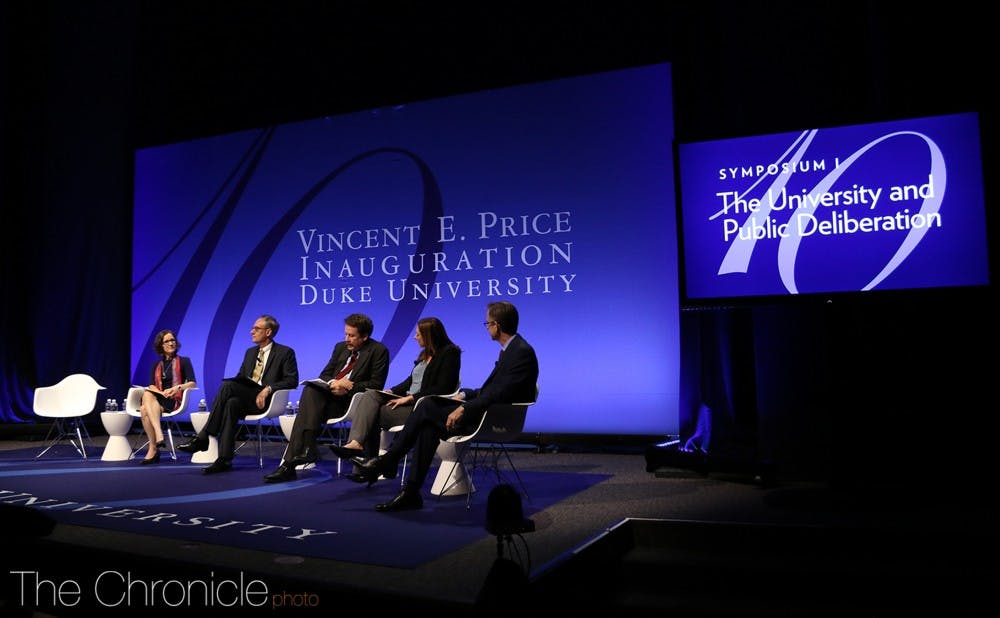As part of the two-day inauguration festivities, President Vincent Price and some of Duke’s most accomplished professors gathered for a symposium Thursday to discuss what the University’s role—if any—is in public deliberation.
The symposium comprised of two panels, moderated by Philip Bennett, Eugene C. Patterson professor of the practice of public policy studies and journalism, and Abbas Benmamoun, vice provost for faculty advancement, respectively. Panel topics were inspired by Price's previous research on the role of public deliberation and differences of opinion.
Panelist D. Sunshine Hillygus, professor of political science, questioned what “public deliberation” meant in the first place.
“When you turn on the news or scroll through your Facebook feed, it is the furthest thing from public deliberation,” Hillygus said. “How do we think about meaningful deliberation when it looks like, from the media and politics, that the world is burning around us?”
Though public communication is usually associated with news and social media, Hillygus said people should not expect the media to provide discussion.
“The incentives of the media are not to promote deliberation,” she said. “Quite the opposite. Their incentives are page views and click-throughs.”
Price agreed, characterizing the problem with today's media system as the emphasis it places on "buying and selling attention."
Price said he saw the participants of public discussion as belonging to one of five groups: leaders, experts, interest groups, reporters and the mass audience.
“We just need to keep it above the line, so that the interest groups, the experts and political elites do everything," Price said, drawing from the political columnist Walter Lippmann. "What the media should do is just keep the public in check.”
Instead, Megan Mullin, associate professor of environmental politics, said that universities should lead the way in public discourse. She said that universities play two crucial roles in public deliberation: providing a “venue for the free exchange of ideas” and “evaluating the quality of ideas.”
Robert Califf, Donald F. Fortin professor of cardiology and former commissioner of the Food and Drug Administration, also noted the power that universities have to drive social discourse.
“Right now, universities and their health systems are the biggest employers in the most parts of the U.S.,” he said, speaking from his experience at the FDA. “I didn’t realize just how powerful universities were as lobbyists.”
Although Hillygus acknowledged that universities should play a “central, foundational role” in fostering discussion, she said other institutions, like high schools and public education systems, play just as important a role.
But all panelists agreed that internet and social media is often not conducive to constructive discussion.
“I joined Twitter last year, and it has caused me quite a bit of stress every time I go on to it,” said Curtis Bradley, William Van Alstyne professor of law. "There's always some kind of flame war or disagreements or people just liking their side versus liking the other side."
Califf said that though Google searches can be a helpful repository of information, they can also be used to mislead people.
“The world’s expert gets no more time on the internet than someone who thought about it for 10 seconds but has a flashy way of saying it,” Califf said.
Mullin suggested that a way forward in fixing this gap in public deliberation could lie in the ability to close the door and have conversations that aren’t all advertised on Twitter and don’t all become part of a public space.
Referencing Price's research on the subject, Mullin also emphasized the need for understanding others’ perspectives.
“If we can explain the reasoning behind somebody else’s opinion, Price argued that our own opinions themselves become more present, more high-quality,” she said.
Price said the problem of public deliberation was ultimately one of civility.
“It’s rooted in how we improve the conditions of the manner of our conversations,” he said.
Get The Chronicle straight to your inbox
Signup for our weekly newsletter. Cancel at any time.

